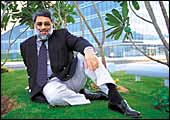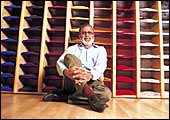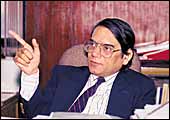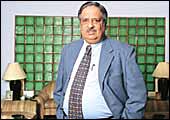|
 Five
years in the life of an insurance company may be a mere blip, but
for Anuroop "Tony" Singh, the CEO and Managing
Director of Max New York Life, they have proved to be long and demanding
enough to think of doing something else. Ergo, the 51-year-old has
opted to be the non-executive chairman of the joint venture insurer
and look at issues such as corporate governance. When Singh, a chartered
accountant by education, joined Max New York from ANZ Grindlays,
he had to create the life-insurer JV from scratch. Apparently, that
took its toll on Singh's family, split as it is between Nice and
Melbourne (one daughter is studying in the latter, and wife and
the other daughter are based in the French city of Nice). "Now
I want to spend more time on things that matter," says Singh.
Like what? A year from now, Singh sees himself being on the board
of "new wave organisations" and dabbling in philanthropy.
Right now, though, he's looking for a successor. Five
years in the life of an insurance company may be a mere blip, but
for Anuroop "Tony" Singh, the CEO and Managing
Director of Max New York Life, they have proved to be long and demanding
enough to think of doing something else. Ergo, the 51-year-old has
opted to be the non-executive chairman of the joint venture insurer
and look at issues such as corporate governance. When Singh, a chartered
accountant by education, joined Max New York from ANZ Grindlays,
he had to create the life-insurer JV from scratch. Apparently, that
took its toll on Singh's family, split as it is between Nice and
Melbourne (one daughter is studying in the latter, and wife and
the other daughter are based in the French city of Nice). "Now
I want to spend more time on things that matter," says Singh.
Like what? A year from now, Singh sees himself being on the board
of "new wave organisations" and dabbling in philanthropy.
Right now, though, he's looking for a successor.
 No
United Colours No
United Colours
Two years ago, Vivek Bharat Ram returned
to the helm of DCM Benetton in a bid to turn around the fortunes
of the embattled Italian fashion brand in India. Now it seems he's
ready to throw in the towel-lock, stock and barrel. The DCM Group
scion is said to have agreed to be bought out by his partner, Luciano
Benetton, thus ending a rocky partnership of 13 years. Benetton,
who could not have been happy with the brand's poor performance
in the country, has plans of his own. Will they pan out? Wait and
watch.
 Change
Of Address Change
Of Address
The distance from mint street to north Block
may be long, but don't expect RBI Deputy Governor Rakesh Mohan
to get hassled about it. As the new Finance Secretary (minus
any last-minute hiccups, the job is his), the 57-year-old Mohan
will feel right at home. A doctorate in economics from Princeton
University, Mohan in his earlier stints was the chief economic adviser
to former Finance Minister Yashwant Sinha and an economic adviser
in the industry ministry in 1993-94. That apart, Mohan has done
extensive work in the areas of economic reforms and liberalisation.
And as things stand, the Left-supported government can do with all
the help it can get.
 Ciao,
Mr. Donati Ciao,
Mr. Donati
It's the second time that Carlo Donati,
chairman and Managing Director of Nestlé India, is packing
his bags and leaving the country. But it's unlikely he'll return
for a third stint in India-at least not with Nestlé. For,
the 57-year-old Donati is moving on as the worldwide Chairman and
CEO of Nestlé Waters. Donati, who first came to India in
1976 and worked as a product manager for three years before being
assigned to Nestlé Portugal, is credited with finding the
company's noodles brand, Maggi, its biggest market-India. But it's
ironic that Donati should be handed charge of Nestlé's water
business. Because it was Donati, into his sixth straight year in
India, who pulled the plug last year on Nestlé's bottled
water brand Pure Life. In any case, Donati has a minor fire to douse
in the global water business-Nestlé's Perrier unit in France
has locked horns with its employees over productivity. But having
not just survived but thrived in the rough and tumble of India's
FMCG business, Donati is probably ready for anything.
Back To A Single Job
 Meleveetil
Damodaran must be the HR manager's dream executive. Not only
does the IAS officer bring superlative administrative skills to
the table, but also the willingness to do three jobs for the pay
of one. Apart from being the chief of the UTI asset management company,
Damodaran is the administrator of UTI-I and the CMD of the beleaguered
IDBI. But come January 2005, the man who steadied UTI will have
one job-at IDBI. The finance ministry has decided not to extend
his tenure at UTI. That, however, doesn't make Damodaran's work
any less challenging. IDBI is to merge with its banking arm start
of next year. Damodaran's brief: Ensure IDBI has a sound future. Meleveetil
Damodaran must be the HR manager's dream executive. Not only
does the IAS officer bring superlative administrative skills to
the table, but also the willingness to do three jobs for the pay
of one. Apart from being the chief of the UTI asset management company,
Damodaran is the administrator of UTI-I and the CMD of the beleaguered
IDBI. But come January 2005, the man who steadied UTI will have
one job-at IDBI. The finance ministry has decided not to extend
his tenure at UTI. That, however, doesn't make Damodaran's work
any less challenging. IDBI is to merge with its banking arm start
of next year. Damodaran's brief: Ensure IDBI has a sound future.
 The
Peace Maker The
Peace Maker
Getting an IAS officer (read: Jagdish Khattar)
to run its operations may be the smartest thing Suzuki Motor has
done in India. Not only has Khattar managed to retain Maruti Udyog's
market leadership, but also excelled at extra-curricular activities-almost
all of which has involved brokering peace between Suzuki and its
local partner, the Government of India. The first time around was
in 1998 when a virtual face-off between the two partners pushed
the company into the red. The second dust-up happened in 2002-03,
when Suzuki and GOI couldn't agree on the disinvestment price. And
the latest occurred last fortnight when the Suzuki boss, Osamu Suzuki,
announced that he would set up a second plant in India as a wholly-owned
subsidiary, enraging the government and investors. It took the bureaucrat
in Khattar to undo the damage. Making cars is one thing and managing
partnerships, quite another.
-Contributed by Amanpreet Singh,
Roshni Jayakar, Shailesh Dobhal and Kushan Mitra
|
